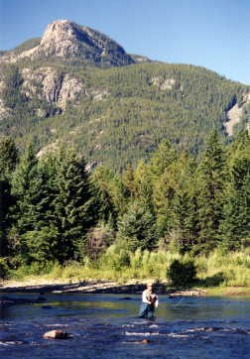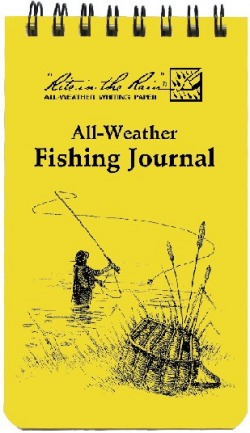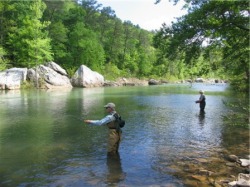FINDING SOLITUDE

One of the best parts about the sport of fly fishing is experiencing the scenery and calmness around you as you are trying to land your big fish. Montana is a great place to find some solitude while fly fishing. In fact, the vast expanses that surround the rivers and streams in Montana can provide you with some of the most relaxing solitude anywhere.
Montana fly fishing is legendary. Anglers from all over the world travel to Montana to experience fly fishing the blue ribbon trout rivers and pristine mountain lakes. Whether an angler seeks to battle trophy sized wild rainbow trout on the Yellowstone River or to experience the solitude of a high mountain lake, Montana provides fly fishing experiences like no other place can.
Montana provides such an abundance of opportunities that visiting anglers frequently have difficulty in deciding where to start their fly fishing adventure. There are so many beautiful places in the hills of Montana that can provide both solitude and great fishing, many people might be overwhelmed. But so many choices provide for some amazing chances at bagging that championship fish!
For example, Lake McDonald in Glacier National Park is a beautiful spot for fly fishing. Flanked by mountains, this lake is not only a beautiful place to catch fish; it’s also an amazing spot for reflecting and relaxation.
Of course, the Yellowstone River is the longest river in Montana. It is free of any major dams, and its flow is not regulated in any way, so you can find an abundance of fish in the solitude of the mountain air. In fact, the Yellowstone River is internationally known as one of the premier trout rivers in the United States.
Even though you can expect to catch a variety of trout including rainbow and brown, you will also find whitefish and sturgeon aplenty. Even though the Yellowstone River is quite well known for its fly fishing in Montana, it is not overtaken by so many fly fishers that you can’t find a spot. It remains a beautiful secret available to those who are looking for the solitude of the Montana countryside.
Finding solitude while fly fishing in Montana is a relatively easy proposition. All you need to do is a little bit of research and ask around. Those who are proud of the fly fishing waters in Montana are always more than happy to share the beauty of their state with people who are wanting to fish the waters.
This Fishing article is brought to you by Article Vista @ http://www.articlevista.com
KEEPING A JOURNAL

Fly fishing is addictive. Once you start, you'll never stop. Whether you are going to the
local water hole or to Alaska, you should use a fly fishing journal to keep track of your sessions.
Fly Fishing Journals
Fly fishing is more than just fishing, it's a peaceful, surreal activity. For many, there is almost a meditative quality to casting. For avid fly fisherman, fly fishing trips to locations such as the Battenkill River in Vermont, Green River in Utah and Letort in Pennsylvania are a must. Of course, the possibility of trips to Argentina, Alaska and other exotic locations can make ones eyes glassy. For many, however, past fly fishing experiences fade from the memory with time. If you had keep a fly fishing journal, this doesn't have to be the case.
There are famous instances of people keeping journals throughout time. Of course, Anne Frank's Diary is the best example. In her diary, Anne kept a running commentary of the two years her family spent hiding from the Nazis. While your fly fishing sessions will hopefully be more lighthearted, keeping a journal will let you remember them as the years pass.
A good fly fishing journal combines a number of characteristics. First, it should be compact. Second, it should have a water-resistant pages and a case to protect it from the elements. Third, the journal should contain blank areas to write your notes. Fourth, the journal should contain cue spaces to remind you to keep notes on specific things. Cues should include:
1. Who you went fishing with,
2. The weather conditions,
3. The fishing conditions,
4. The flies you used, what worked and what didn't,
5. What you caught, and
6. Lodging and places to eat,
As time passes, your fly fishing journal can be used as:
1. A guide for you or friends that return the same location,
2. Information on gear and flies to take,
3. Memories to reflect upon years later, and
4. Something to pass on to your children and grandchildren.
Keeping a fly fishing journal only requires a few minutes of writing. You can fill it out on the ride home or during a break. As time passes, your journal will become a collection of incredibly valuable fly fishing information. Imagine the look on a friend's face after they mention going on a trip and you whip out your journal for the spot!
ANGLER'S ATTENTION

There is something that I have called 'angler's attention'. It is developed after you have been fishing, and in this article we will be concerning ourselves with fly fishing, for years and years. You can usually tell those that have it and those that don't. Quickly rigging up your fly rod, and racing to a likely fishing spot, solely concerned about yourself and your gear, are telltale signs of someone not possessing angler's attention.
I spent many years, especially when I didn't have much time to fish, ignoring angler's attention. If I could steal away even an hour or two, racing down to the river I would go. In a virtual panic, scouring out my favorite fishing spots, then cursing to myself, when they were taken. Frantically I would find a spot to fish, splash out there, and heave out my line. Fishing, at last, my heart would race, I would set the hook on any minute bump, and then have to untangle my line from a tree lurking behind me. Never paying attention to the fly I was using, there wasn't time to change it, wheter my tippet was proper, what was happening on the water, nothing of the sort. Just get me to the water, and let me wet my line.
Maturity probably plays as much a part in developing 'angler's attention' as anythin. Although I have seen many young angler's very deliberately observing and then selecting their approach. Besides natural aging what really changed things for me, was actually observing a fellow fly fisher. Actually it was more observing him, observing me. I was fishing a small stretch of fairly remote river. Although this particular spot became 'discovered' sometime in the 90's, it is still relatively pressure free after mid-June. Happily csting to rising fish, I happened to spot a gentleman stading on the bank watching me fish. He was quite a bit older then me at the time, but his presence somewhat annoyed me. Feeling watched, I gave it another five minutes or so, then headed in.
The next thirty minutes or so were spent discussing fly fishing with this gentleman in ways I had never thought of before. The knowledge this man possessed and frankly the lack of urgency to wet his fly were astonishing. He seemed quite as content to stand and talk about fly fishing as he was to actually be out doing it. He discussed with me clouds and mayfly hatches, the current time of the Callibeatis hatch, the onset of the Giant Stonefly hatch based on elevation, water flow, and air temperature, the need to have your fly drift naturally. The benefit of watching the naturals on the water, the effect of line drag, etc, etc.
After I had finished my lunch, did he finish talking. And then asked if I wanted to give it another try, motioning out to the water. I told him to go ahead, it must be his turn, and he said there was room for two. He was definitely a talented caster, one of the best I had ever seen, gracefully placing his dry fly expertly in the feeding lanes, on the edges of deep pools, and right below large rocks that were all favorite holding places for trout. Stopping when the hatch slowed and beginning again when the hatch began.
From this expereince, I have deliberately honed my own angler's attention, and marvel not at what I notice, but what goes unnoticed by many. And many think it is unnecessary information, figuring they will catch fish using the same tactics they always have, or there just aren't fish to be had that day.
For those that routinely ignore the hints that Mother Nature is giving you in solving the what will fish hit today puzzle. Next time try taking a few minutes to observe the minute details of the place you are fishing. Start with the big picture, the water flow, clarity, time of year, guess at the water temperature (some take a thermometer), consider the time of day, the air temperature. Then look closer, look at the current world of the fish you are trying to entice. Turn over a few rocks, look at the bugs there, some take a screen and place it in the current to view the offerings fish are being presented with. Observe the surface of the water, check for dimples, for feeding fish right below the surface. Actually spotting fish in the water takes practice. Then look for hatching insects, for insects laying eggs over the surface, and of course that greatest of all fly fishing prizes the rising fish.
Observe it all, not just before fishing but the whole time, watch for nuances, changes in the air temperature, changes in the sunlight, the hatches, the surface activity. Are you hooking up deeper, shallower, suddenly less frequently. Be a part of the fly fishing equation, at peace with it, in harmony with it, and you will be amazed how much more you enjoy it.
As you go along, you will find yourself unable to look at any river or lake, without observing it in this way. Even if you are just driving by it. You will be amazed at the hatches you can observe from your car, you wil find yourself analyzing the bugs on your windshield. Angler's Attention will just be the way you looki at the entirety of the fish, insect relationship, and everytime you find yourself fly rod in hand, you will be the better fly fisher for it.
